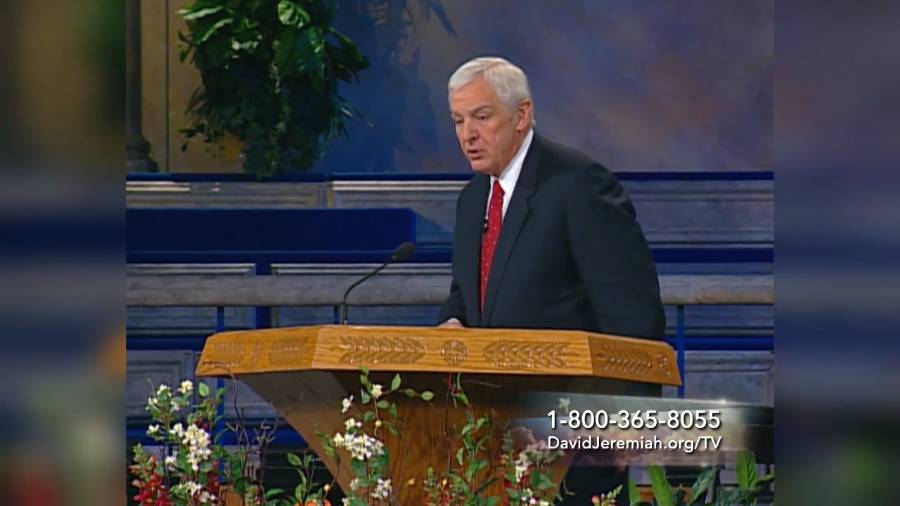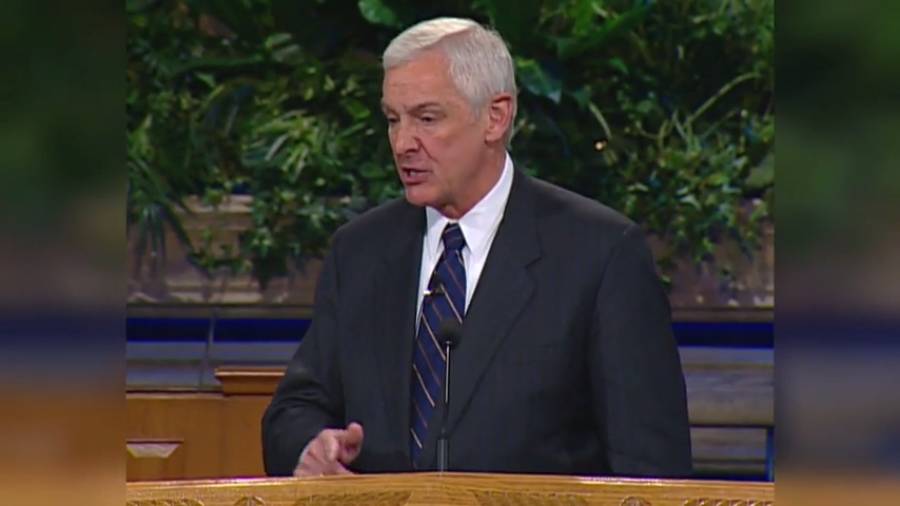What we think about heaven determines how we live today. I can tell you from my own personal experience and from my years of pastoral ministry and Bible teaching, when you study the biblical doctrine of heaven it will stir your heart and change your thoughts. The truth of heaven not only provides anticipation regarding our future; it also comforts us on behalf of those who have gone before us. Heaven is already a heavily populated land, filled with glorious residents. When we arrive there, we'll receive a grand welcome.
Here are answers to a few questions about heaven along with Bible passages you'll want to study on your own.
Are the streets of heaven really paved with gold?
Gates made of pearl, foundation of precious stones, streets of gold… . We've heard these descriptions of heaven, and they are directly from the Scriptures. In the book of Revelation, John gives us a glimpse of the New Jerusalem in all its majesty:
She had a great and high wall with twelve gates, and twelve angels at the gates.... The construction of its wall was of jasper; and the city was pure gold, like clear glass. The foundations of the wall of the city were adorned with all kinds of precious stones: … jasper … sapphire … chalcedony … emerald … sardonyx … sardius … chrysolite … beryl … topaz … chrysoprase … jacinth … amethyst. The twelve gates were twelve pearls: each individual gate was of one pearl. And the street of the city was pure gold, like transparent glass. Revelation 21:12, 18–21
This is the New Jerusalem—heaven's capital—described in Scripture. This is the Father's house Jesus described to His disciples, where He was going to prepare a place for them, and where He has prepared a place for us (John 14:1–4).
Is there a purgatory?
There is no purgatory or middle holding ground for souls where they have a second chance to gain forgiveness from their sins.
The Bible does teach about an intermediate heaven. Every believer who died prior to the Ascension of Christ went to this intermediate heaven called Paradise (Abraham's bosom; Luke 16:19–23).
But when Jesus ascended after His death, He went into Paradise and took all who were there—all the Old Testament saints, all who had died and believed in God before the Ascension—with Him to the third heaven (Ephesians 4:8–10).
This means that believers no longer go to the intermediate heaven upon death. The soul and spirit of today's believers go immediately to the third heaven, because Paradise is no longer an intermediate place; Paradise is now with God (2 Corinthians 12:2–4).
Do dogs go to heaven?
The Bible does not clearly state whether we will see our pets again in heaven, but there are Scriptures that suggest the presence of animals in heaven.
In Isaiah 11:6 we are told that during the Millennial Reign of Jesus on earth, "The wolf also shall dwell with the lamb, the leopard shall lie down with the young goat, the calf and the young lion and the fatling together; and a little child shall lead them." A similar scene is painted later in Isaiah 65:25. It's clear there will be animals on earth during the millennium and that predator and prey will live in harmony.
Later, John gives us a glimpse of heaven in Revelation 19:11, 14: "Now I saw heaven opened, and behold, a white horse. And He who sat on him was called Faithful and True, and in righteousness He judges and makes war… And the armies in heaven, clothed in fine linen, white and clean, followed Him on white horses." Jesus and His armies will ride white horses to capture Satan and the False Prophet and cast them into the lake of fire forever.
It seems pretty clear that there will be animals in heaven. Whether the ones we loved on earth will be there is uncertain. Whatever the case, we know the character of God and His love for us. He gives "good gifts to those who ask" (Matthew 7:11) and "gives us richly all things to enjoy" (1 Timothy 6:17). Heaven will be a place of joy and peace and the richest of blessings as we live in the presence of God and enjoy His good gifts for eternity.
What is the Lamb's Book of Life, and will my name be in it?
The Bible says that in heaven there is a book called the Lamb's Book of Life (Revelation 21:27). And the names of all who will be in heaven are recorded in that one book.
William R. Newell, a great Bible scholar, said there are four things to be noted about the Book of Life:
It is the absence of one's name in the book, not the absence of one's good works, which dooms a person.
Evil works are not the issue. Many of earth's greatest sinners' names are recorded in the Book of Life because they accepted God's offer of salvation.
Those whose names do not appear in the Book are cast into the lake of fire (Revelation 20:15)
All names found in the Book were written before the Judgment Day. There is no record of names being recorded (decisions being made) on that day.1
We cannot earn our passage to heaven simply by being a good person or by living a good life. Ultimately, we will not be granted entrance to heaven unless we repent of our sin and accept Jesus as our Lord and Savior—then we can have full confidence that our names are recorded in the Book of Life.
Will we know each other in heaven?
We will be recognizable in heaven, just as Christ was identifiable to His disciples when He returned to earth after His resurrection (John 21:12–13). But we will have new physical bodies that are designed for heaven, not earth.
Because we will be God's people made over, we will be perfectly compatible with one another and able, for the first time ever, to enjoy the intimate fellowship that we all long for in our hearts. Along with anticipating heaven itself, imagine having the unlimited opportunity to fellowship with people from all ages of history—even people we've only read about in books.
There's a whole list of people I'd like to meet: David and Joseph and Daniel from the Old Testament, C.S. Lewis, Charles Haddon Spurgeon, Andrew Murray, A. W. Tozer, and many others.
What an incredible time of fellowship! We can't possibly comprehend it completely; we're going to live together in community and be able to have unlimited fellowship with one another for all of eternity.
Do I have a "guardian angel"?
As far as I can determine, there are just two verses in the Bible that indicate there might be guardian angels in the world today. The first is Matthew 18:10: "Take heed that you do not despise one of these little ones, for I say to you that in heaven their angels always see the face of My Father who is in heaven." Apparently, some of God's angels are assigned to stand ready before the Father to respond instantly to His command for protection and care over these children. Jesus calls these particular angels "their angels." And that's why some people have used this passage as proof that everyone has an angel.
The second passage that seems to support guardian angels is in Acts 12. After Peter was released from jail he went to the home of Mary, where a group of Christians was praying for his release. A servant named Rhoda answered Peter's knock at the door. She was so excited to hear his voice, she left him outside and ran to tell the believers Peter was at the door. They didn't believe her and reasoned the person at the door must be Peter's angel.
Now, those are the only two passages that I'm aware of that allude to the idea of guardian angels. Having said all of that, let me also present to you the other side of the story, because while many believers throughout church history have believed in guardian angels, others have rejected the idea, feeling these two texts are not proof enough to construct such a doctrine. As you read the Scriptures, there were many times when more than one angel was called into action on behalf of one of God's chosen. Several angels carried Lazarus' soul to Abraham's bosom. And Elisha and his servant were surrounded by many angels. The psalmist writes that all the angels rally for the protection of one saint.
Now, we can't know with absolute certainty whether or not each believer has a guardian angel. But we do know that God's angels care about us and that they can intervene in our lives as they are called by God—and that's a wonderful thought!
What if my earthly body is cremated? Will I still receive my new body in heaven?
In 1 Corinthians 15, Paul writes, "And what you sow, you do not sow that body that shall be, but mere grain—perhaps wheat or some other grain. But God gives it a body as He pleases, and to each seed its own body" (verses 37–38).
Paul is using an illustration here. If you put a kernel of corn into the ground and let it grow, the green stalk that comes out of the ground is not the kernel. It's part of the kernel; it represents the kernel; but it's not the same as the original kernel. In other words, the body that comes out of the grave on the day of Resurrection is different from the body that went into the grave.
Whether we have a body in a grave to be resurrected or our body is to be destroyed by fire or some other disaster, an incorruptible body will be resurrected to join with Christ in the air on that great day.
How big is heaven?
The Bible doesn't tell us the full expanse of heaven, but it does give us the measurements of the New Jerusalem, the capital city of heaven. It will easily be able to house all of the people who have ever trusted in Christ. And this heavenly city will not be crowded by any means.
In Revelation 21:16, John says, "its length, breadth, and height are equal," each "wall" measuring 12,000 furlongs. This means the New Jerusalem is about 1,500 miles high—that's more than 2 million square miles on the first "floor" alone! And given that this city is cubical, we can assume that it will have more than one level. Remember, we cannot fathom the grandeur of this place. It will be unlike anything we have ever seen, and there is no question that it will be able to house every believer who has ever lived.
Can people really go to heaven and return?
It seems the bestseller list goes through a revolving trend where books are featured that list details about someone's near–death experience, during which they say they glimpsed scenes in heaven. I take those stories with a grain of salt because they don't represent our definitive source of information about heaven, which is only in Scripture.
But the Bible does tell us the apostle John saw heaven. That's how we have the book of Revelation!
Revelation 4:1 tells us John was given a vision of heaven. He saw a door open and found himself peering through a portal into heaven itself. When God allowed John to see a glimpse of the beauty, brilliance, and worship in heaven, he then obtained a new perspective on his life here on earth. His exile in Patmos was seen in view of the home that God has prepared for us—a home that is just as real as our temporary dwelling but is inexplicably glorious and will last for all eternity.
1William R. Newell, The Book of The Revelation, 9th edition, (Chicago: Moody Press, 1953), 334.

















